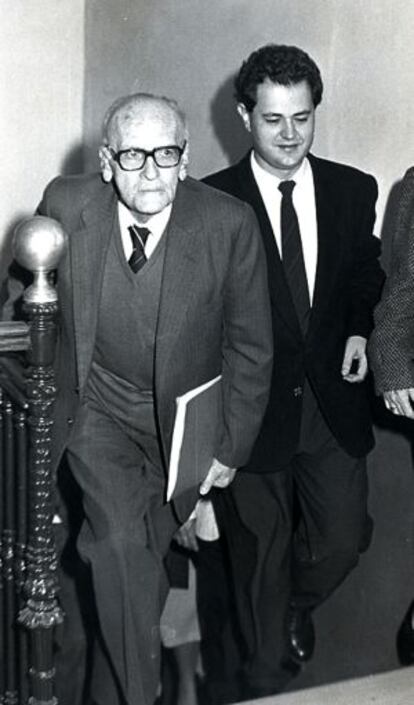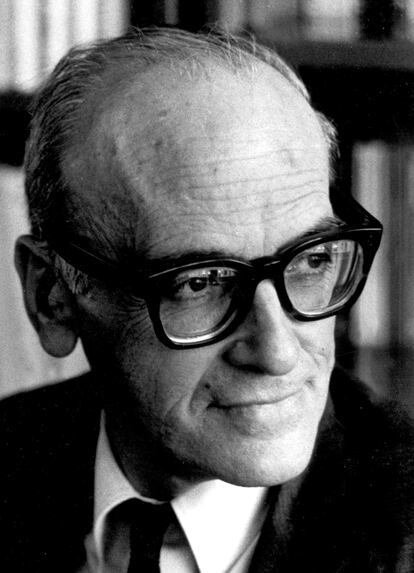“Everything begins in exile, as the painful and late full fulfillment of my vocation as a writer,” wrote Manuel Andújar (La Carolina, Jaén, 1912-Madrid, 1994), considered one of the most outstanding prose writers of exile and the War. Civil. Trained in exile, Andújar is known above all for his trilogy Vespers and his novel Stories from a story about the Civil Warbut now his lesser-known, although much more prolific, work has come to light, with the University of Jaén publishing two volumes that compile 535 articles, columns, reviews, speeches and other texts published between April 1928 and January 1939 in the diaries UHP, from Lérida, and The News, from Barcelona.
“They are materials that clearly manifest some of the ideas and early literary inclinations of a very young Manuel Andújar,” says Luis Antonio Esteve Juárez, author of the edition of this compilation work of what can be considered the prehistory of the Carolina writer. The bulk of these writings appeared during the Civil War in the newspapers UHP, of Lérida, a publication of Marxist ideology of which he was editor-in-chief, and The News, from Barcelona. Thus, in its section titled Parenthesis, from the diary UHPAndújar recognized that “apart from the war reports and the climate, it dealt with cultural manifestations and responded to the thirst for knowledge,” while in The Street It expressed his “passionate inquiry into altered customs.”
“Manuel Andújar had begun on the path of journalism, frequented by other writers since the 19th century, and the fact that many of these steps were conditioned by the war is no reason to silence or ignore them, because journalism is always conditioned by the historical situation,” says Esteve. Manuel Culebra Muñoz, who always wrote under the pseudonym Manuel Andújar, lived in Linares (Jaén) and in Málaga and his childhood and adolescence were marked by the poliomyelitis that he suffered since childhood. His first literary dabbles were published in The Little Orphana magazine from the College of Medical Orphans, at the request of Professor Régulo Martínez, a relative of the family. In 1931 he became part of the Youth of the Radical-Socialist Republican Party of Malaga.

Already in Madrid, in 1934 he began to join the Socialist Youth and a year later he began to work as an administrative assistant of the Cadastre in Barcelona, where he maintained his political work. The military uprising of July 18, 1936 surprised him at the headquarters of the Banking Union, on Vergara Street in Barcelona, next to Plaza de Catalunya.
In the Civil War he became a combatant and joined the Durruti Column in Lérida. Collaborate in newspapers The News y UHPrespective spokespersons for the UGT and the PSUC. And from Catalan lands he does not forget his Andalusian roots and hence this paragraph of the article Lime and blood published on February 20, 1937: “Jaén has always been politically brave. The miners from Linares and La Carolina, those others locked up in the middle of the El Centenillo mountain. Lungs shattered, kidneys and bravos torn down by the levy. Man becomes harsh and harsh, home repels him, he lacks restful joy. “Life is reduced to seeing a funeral pass by periodically.” This article is a synthesis of the environment of the mining towns of northern Andalusia, just as when it referred to the Andalusia the high in reference to the bombing ordered by Queipo de Llano on the sanctuary of Andújar, from where he acquired that toponym as a literary pseudonym.
And before embarking on exile he had time to capture his love affair with the city of Barcelona in another article: “We are sure that the liberal spirit of Barcelona will be installed on the fronts to combat the offensive of those two brutal countries that are dedicated to spread the sadness of war throughout the world,” he wrote in The Street on January 14, 1939. At the end of January 1939 he went into exile, first to France (to the Campo de Saint-Cyprien) and then to Mexico, aboard the ship Sinaia. There he intensified his literary production with novels, stories, articles, poems and theater, until his return to Spain in 1964.
Return to Spain
Manuel Andújar was, along with Rafael Alberti, Jorge Guillén and José Bergamín, one of the few who returned to Spain, although he did so discreetly. Professor Luis Antonio Esteve, who is a member of the Spanish Literary Exile Study Group and is in possession of a thesis on Manuel Andújar, considers that the writer from Jaen presents his vision on the causes, development and circumstances of the Civil War, such as the positioning of the European powers, the ideological and economic framework of fascism, revolutionary terror, concern for children and women, the particular situation of Catalonia and on events or figures of the moment.
Andújar pointed out that in exile there was “the painful and late full fulfillment” of his vocation as a writer. But, as Esteve indicates, “that full fulfillment implied another previous and incomplete one, some first steps that deserve, at least, to be known.” This is how Andújar was referring to his role as a journalist, which he spoke about in his article. Echoes of war, published in UHP on October 8, 1937: “Newspapers must be a faithful reflection of the facts, of the course of events, a clean mirror of the struggles that the day brings and the night carries. Camouflaged school of agile current affairs, interpretation of realities, modern, summarized and fast expression of the history of our time. But each publication of this genre responds to a specific conception, to a mixed quality of circumstance and place.”
Television success
However, the trilogy that most popularized Manuel Andújar, in part thanks to its adaptation to television at the end of the eighties, was the cycle Vespersformed by the novels Plain (1947), The defeated (1949) y The fate of Lazarus (1959). The common link of all of them is the painful historical reality that is manifested in the injustices that prevail in the rural world and against the abuses of the Andalusian lord.
“The metaphysical voice of Manuel Andújar moves because he knew how to look inside, speak about the human condition and assume the freedom of the poet to create eternity, a thousand times.” Paul Aubert, professor of Contemporary Spanish Literature and Civilization at the University of Marseille, glossed in this way the work and life of one of the most important Spanish intellectuals and thinkers of the last century and, at the same time, one of the great forgotten . He did so by participating, in 2013, in the international seminar with which the Jaén Provincial Council commemorated the centenary of the birth of Andújar.

